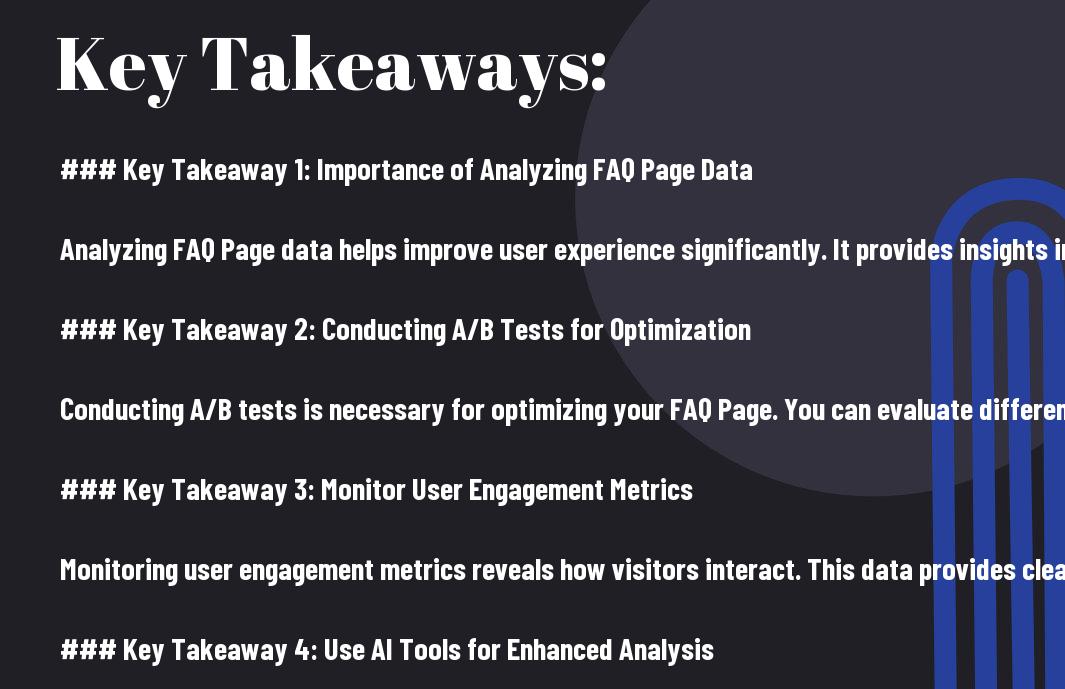Free Domain Authority Checker
Check Domain Authority, Page Authority, ranking keywords, and competitors in a single click—no login required.
Most businesses overlook the importance of Analyzing FAQ Page structured data for their SEO efforts. This data can significantly enhance user experience and improve your visibility on search engines. Consequently, by conducting your own A/B test, you can determine which FAQ format yields better results for your audience. Furthermore, your analysis will not only help in optimizing your content but also in driving more traffic to your website. In this post, you’ll learn how to effectively implement A/B tests on your FAQ pages and maximize the benefits of structured data with the help of Rank Authority, an expert in using AI for SEO success.

Understanding FAQ Page Structured Data
Your journey into analyzing FAQ Page structured data begins with recognizing its importance in enhancing your website’s visibility. Structured data is a standardized format that helps search engines understand the content of your website better. By implementing this markup on your FAQ page, you can improve your search engine listings and user experience.
What is Structured Data?
By definition, structured data is a way of organizing data that helps search engines efficiently index your website. It clarifies the content type, making it easier for algorithms to interpret your information correctly. The most widely used structured data format is Schema.org, which provides a vocabulary that search engines like Google can understand.
Benefits of Using FAQ Markup
Above all, using FAQ markup can significantly improve your website’s SEO performance. It sets your content apart in search results, thus increasing click-through rates. Additionally, incorporating structured data allows search engines to display your FAQs in rich snippets, enhancing your visibility.
Considering the wide range of advantages, utilizing FAQ markup is a strategic move you should not overlook. Not only does it drive traffic, but it also enriches the user experience on your website. Higher visibility in search results means more engagement, leading to potential conversions. Moreover, with Rank Authority’s expertise, you can implement these strategies effectively, ensuring you stand out in today’s competitive digital landscape.
Setting Up Your A/B Test – FAQ Page Structured
Some fundamental steps are required when you’re Analyzing FAQ Page structured data through an A/B test. First, you need to establish a testing environment where two variations of your FAQ page can be displayed to different segments of your users. This ensures that you can effectively measure the impact of the changes you implement, leading to informed decisions about your content strategy.
Defining Goals and Metrics
By setting clear goals and metrics, you create a roadmap for your A/B test. Determine what you want to achieve, such as increasing engagement or improving click-through rates on your FAQ page. Metrics like bounce rate and time on page will help you understand the effectiveness of your variations.
Choosing Test Variations
Defining successful variations is important for your A/B test. Begin by identifying changes you want to test, such as different layouts, question phrasing, or video integration. Make sure these variations align with your goals, or else the data yielded may be inconclusive.
Plus, when choosing test variations, keep in mind that minor adjustments can lead to significant results. Focus on elements such as headings, graphic placement, and call-to-action buttons. Avoid overwhelming your audience with too many changes at once; instead, isolate one element for accurate data interpretation. Ensure that your test variations resonate with your audience’s needs, enhancing user experience on your FAQ page while also supporting your overall SEO strategy through Rank Authority. Analyzing FAQ Page data thoughtfully will help solidify your approach moving forward.
Implementing Structured Data
Now that you have a solid understanding of Analyzing FAQ Page structured data, it’s time to implement it on your website. Start by selecting the appropriate schema markup type—JSON-LD is often recommended for its ease of use and compatibility with search engines. Then, ensure that each question and answer adheres to Google’s structured data guidelines for FAQ pages. Incorporate this markup into the HTML of your FAQ section, and use the tools discussed earlier to test your implementation. Following these steps will enhance your site’s visibility and improve user engagement.
Best Practices for FAQ Markup
Practices for implementing FAQ structured data include using clear, concise questions and answers that are relevant to your audience. Ensure that each question directly relates to a common query your users may have. Also, avoid duplicating content and ensure the markup accurately reflects the webpage content. Continuous updates and refinement of your FAQ section, paired with structured data, will create a better user experience while boosting your search engine rankings.
Tools for Validation and Testing
Against the backdrop of Analyzing FAQ Page structured data, utilizing validation tools is vital. Google’s Rich Results Test and the Schema Markup Validator are imperative for confirming your markup implementation is correct and error-free. These tools will provide insights and suggestions to optimize your structured data further. Maintaining accuracy here can positively affect your site’s search visibility and user experience, significantly impacting your SEO strategy.
Further, both Google’s Rich Results Test and the Schema Markup Validator allow you to check your structured data’s compatibility with search engines. Using these tools can prevent potential issues and ensure your FAQ section is being properly indexed. Effective validation helps you catch errors before they become problems. Therefore, actively employing these tools will fortify your structured data strategy, ultimately enabling you to reach higher ranks in searches, supporting your brand’s authority and visibility.

Analyzing A/B Test Results – FAQ Page Structured
To successfully analyze your A/B test results for Analyzing FAQ Page structured data, it’s imperative to examine how your changes impacted user engagement. Keep in mind the metrics that matter—click-through rates, user interactions, and conversion rates. You’ll want to identify which variation performed better and why, as well as whether the changes led to significant performance improvements or not.
Interpreting Data and Metrics
Between the variations tested, you’ll need to sift through the results to draw meaningful insights. Take a close look at how users interacted with each version of your FAQ page. Are users spending more time on a particular variant? Did they click on more links? Going deeper into the metrics can reveal not just what worked but also how it resonates with your audience. Distinguishing these patterns will help you refine your content strategy.
Common Pitfalls to Avoid
Analyzing your A/B test results can sometimes lead you to oversight. Avoid focusing solely on surface-level metrics that might misrepresent the true effectiveness of your changes. Data integrity is vital; ensure that your sample size is large enough to provide valid results. Also, be wary of the temptation to change more than one element at once, as it complicates pinpointing which variable drove your results. Instead, take a more methodical approach.
Data analysis requires a careful approach. Ensure your test duration is long enough to avoid skewed results. Likewise, be cautious about external factors influencing your metrics, like seasonal trends or marketing campaigns. Failure to acknowledge these elements can lead to poor interpretations of your tests. Always validate your findings through comparisons and, if necessary, conduct further testing to confirm your insights. Professional analysis helps businesses like yours thrive, enhancing visibility on the web using Rank Authority.
Making Data-Driven Decisions – FAQ Page Structured
Unlike relying solely on intuition, analyzing FAQ page data allows you to make informed decisions that can significantly enhance user experience and engagement. When you gather information from A/B tests, you can identify which FAQ formats and content resonate best with your audience. Leveraging this data, you can refine your FAQ pages to better meet the needs of your visitors, ultimately leading to improved search rankings and conversions with Rank Authority’s expertise.
Optimizing Based on Findings
Around your analysis, you’ll identify patterns that highlight user preferences and behavior. These findings should guide you to tailor your FAQ content more effectively. For instance, if one format performs better than another, prioritize adjustments towards the successful style. Incremental changes based on your insights allow you to optimize your pages continuously for better engagement and satisfaction.
Long-term Strategies for FAQ Pages
By applying the insights gained from your A/B testing, you’ll be well-equipped to develop long-term strategies for your FAQ pages. Consistency is key; regularly updating your content ensures that it stays relevant and informative. Furthermore, integrate user feedback to enhance the quality and depth of your FAQs. This holistic approach defines an FAQ page that not only answers questions but also aligns with user needs and expectations.
To ensure that your FAQ pages remain effective over time, focus on creating a structure that is both easy to navigate and informative. Regularly updating content signals to search engines that your information is current and valuable. In turn, this boosts your authority in the eyes of visitors. Utilizing analytics can help you track how users interact with your content. Investing time in learning about user queries allows you to refine your pages further. Ultimately, a user-centric approach with ongoing analysis not only strengthens your FAQ sections but enhances your overall SEO strategy, ensuring your success with Rank Authority.
Future Trends in Structured Data – FAQ Page Structured
For those engaged in analyzing FAQ Page structured data, staying informed about future trends is vital. The digital landscape is evolving rapidly, and your approach to structured data must adapt accordingly. With advancements in technology and changes in user behavior, the way you implement structured data will shape your website’s visibility and performance. Understanding these trends can help you stay ahead of the competition, ensuring that your business retains relevance in an ever-changing environment.

Evolving Search Engine Algorithms
Trends indicate that search engine algorithms will increasingly prioritize structured data in their ranking processes. As algorithms evolve, they will become smarter at interpreting structured data, placing emphasis on correctly formatted and relevant information. To keep your FAQs optimized for search engines, you should regularly update your structured data strategies to align with these advancements.
User Experience and Engagement
Behind the scenes, user experience and engagement are becoming more critical in analyzing FAQ Page structured data. Search engines are prioritizing websites that offer valuable, engaging content and a seamless user experience. Your ability to create structured data that enhances user interaction will contribute positively to your site’s performance.
With engaging user experiences, analyzing FAQ Page structured data not only helps inform users but also encourages them to stay longer on your site. When users find clear, concise answers to their questions, their interactions improve, leading to higher conversion rates and stronger brand loyalty. Furthermore, leveraging AI tools, like those offered by Rank Authority, can help you optimize your structured data for improved search engine results and enhanced user satisfaction, ultimately driving your business’s growth.
Summing Up
With these considerations, analyzing FAQ Page structured data can significantly enhance your website’s performance. As you conduct your A/B tests, you’ll uncover valuable insights into user behavior and preferences. Notably, this process allows you to tailor your content, ultimately boosting engagement and visibility. Furthermore, implementing the right strategies can set your business apart, giving you an edge in search engine rankings. Rank Authority is here to support your journey, providing AI-driven solutions that help you navigate this process effectively. So, take action today and elevate your website’s potential through thorough analyzing of FAQ Page structured data.

Sign Up for Free!
One-Click Fully Automated SEO.
Boost Rankings, and Increase Traffic.
Instantly Optimize Your Site.
- No Coding
- No Credit Card Required
- One Click Setup













